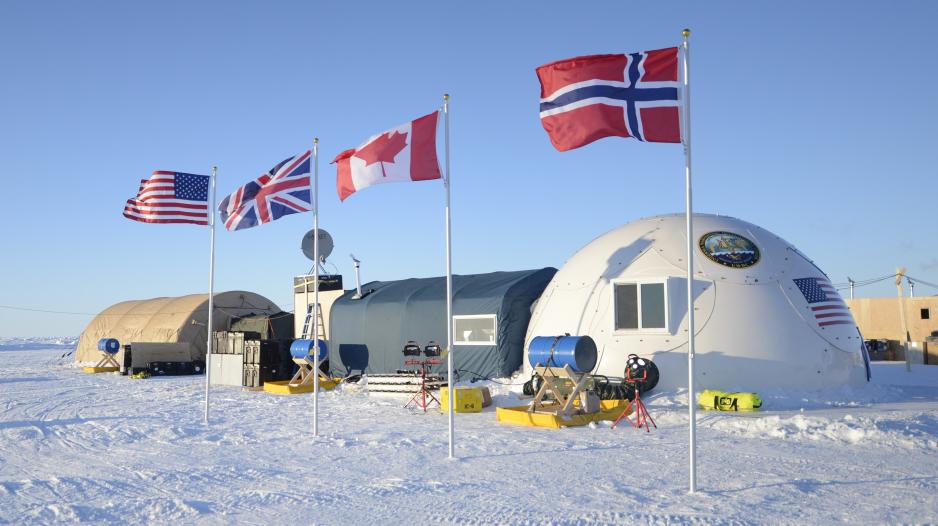Norway’s Border with Russia Shapes Its Arctic Policy New Study Concludes

A new study published by The Polar Journal identifies geography as a key factor to understanding Norway's and Canada's differing approaches to Arctic security. In addition, the study concludes that the way the two countries rely on and utilize NATO shapes their Arctic security policies.
The authors of the study, Andreas Østhagen, Gregory Levi Sharp, and Paal Sigurd Hilde, explain that the Arctic must be understood not as a singular region, but as a series of distinct subregions "where the dominant security variable is Russia."
"Norway's approach to NATO is arguably quite different from its fellow Nordic NATO-members," informs Østhagen. The direct border with Russia and being strategically important in the North Atlantic are key explanatory factors."
The new research analyzes and compares Norway's and Canada's divergent approaches to security in the Arctic during the years of the Stoltenberg (2005-2013) and the Harper (2006-2015) governments and asks why Norwegian and Canadian security interests in the region differ.
On the background of rising military activity in the Arctic, including increasing Russian military patrols along the North Norwegian coastline, Norway envisioned a new and larger role for NATO in the region in the mid 2000s. This approach, however, was firmly rejected by Canada, which did not see a traditional military security role for the alliance in the region.
The authors explain that Canada's understanding of "Arctic security" differs substantially from that of Norway. While Norway's Arctic security, as part of its broader security policy, has been dominated by managing its relationship with Russia, Canada's Arctic security policy revolves primarily around the issue of sovereignty as well as social and economic security. Simply put, the absence of a direct and proximate threat from Russia is a determining factor in Canada's approach to Northern security.
While Canada's Harper government overplayed Arctic military security concerns and appealed to the country's Arctic identity for political purposes, Norway, which did face growing Russian military activity along its borders, engaged in a converse strategy. Under the Stoltenberg government the country placed an emphasis on cooperating with Russia – including the settlement of a four-decade-old maritime border dispute in the Barents Sea – and publicly downplaying security concerns, while at the same time upgrading military capabilities and enhancing deterrence.
Beyond differing geographic locations, the way each country utilizes and relies on NATO also helps to explain these opposing approaches. While Norway's security architecture and its efforts to balance against the asymmetric relationship with Russia heavily relies on NATO, Canada more strongly relies on bilateral security arrangements with the United States for its Arctic security. Thus, in an effort to rebalance against a resurgent Russia in the Arctic, Canada did not look towards NATO while Norway did.
In more recent years the two countries’ positions have become aligned more closely, explains Østhagen. "After 2014, Norway started emphasizing the North Atlantic and "northern" security region instead of "Arctic security", whereas Canadian decision-makers have increasingly become engaged in the same region. Canadian participation in NATO-exercises in Norway, as well as contribution to NATO forces in the Baltics, speak to this."
The annexation of Crimea by Russia in 2014 also changed the equation. "While Russia has been investing in the Arctic and its capabilities there, I think it needs to be understood in the larger context of international tensions over Crimea," explains Sharp. In this respect, the relatively minor differing views of two Arctic NATO members over Arctic policy became subordinate to the overall approach of NATO towards Russia.
Østhagen voices a similar sentiment. "There is less talk about Arctic security and more talk about Russia, the ‘North’, and the Baltic and Barents Seas. Although much of this is focused on parts of the Arctic, the Arctic as such is not the emphasis. At the same time, we have also seen increased NATO-interest in the Arctic after events in Ukraine."
As for Norway, “there also seems to have been a realisation that an explicit NATO policy for the Arctic might not achieve much, or in fact be needed,” concludes Østhagen.
With respect to how an increasingly strained relationship between Canada and the United States may affect Canada’s perception of its Arctic security, Sharp does not think that economic disputes between the two countries will spill over into military cooperation.
"Although the US-Canadian relationship has certainly been showing some signs of strain recently, this has been predominantly over economic issues. I suspect military cooperation will remain largely unaffected as these bilateral initiatives are not done solely for Canada's benefit but also benefit the US."
